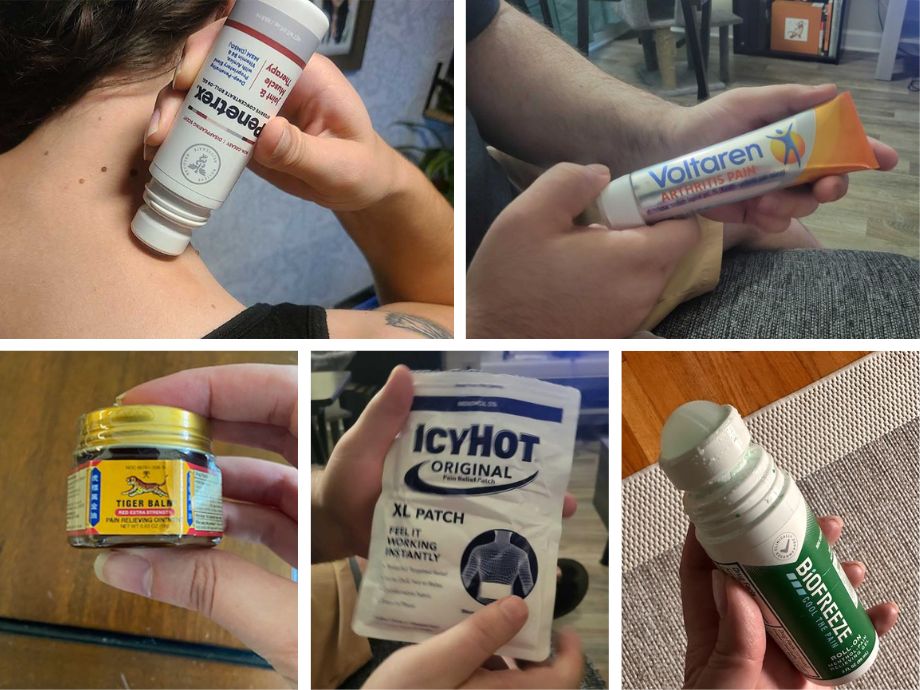We test and review fitness products based on an independent, multi-point methodology. If you use our links to purchase something, we may earn a commission. Read our disclosures.
Anyone who has a garage full of home gym essentials knows that training can help improve your quality of life and longevity. However, fitness fanatics also know that training regularly will lead to some sore muscles and aches. To help alleviate a bad case of DOMS—delayed-onset muscle soreness—we’ll go with a muscle pain relief cream to alleviate some of our distress.
Your latest bout of a sore trapezius or hamstring muscle has probably led you here, where I’m about to break down the best muscle pain relief creams on the market. Our team at Garage Gym Reviews has tested top brands to provide you with top picks to help ease and relax your muscle pains and aches.
Being a group of professionals—certified personal trainers, coaches, and lifelong athletes—we’ve experienced muscle soreness, strains, and pains ourselves, so we know what to look for in topical ointments and muscle rubs. Without further ado, let’s break down our best picks to aid in your recovery.
The 5 Best Muscle Pain Relief Cream
- Best Muscle Pain Relief Cream Overall: Tiger Balm Pain Relieving Ointment
- Best Budget Muscle Pain Relief Cream: BioFreeze
- Best Muscle Pain Relief Patch: Icy Hot Original Pain Relief Patch
- Best Muscle Pain Relief Roll-On: Penetrex Joint and Muscle Therapy Roll-On
- Best Muscle Pain Relief Cream for Joints: Voltaren Arthritis Pain Gel
Best Muscle Pain Relief Cream Overall: Tiger Balm Pain Relieving Ointment
Good for: People looking for a time-tested topical pain relief cream
Best Overall
Tiger Balm Pain Relieving Ointment
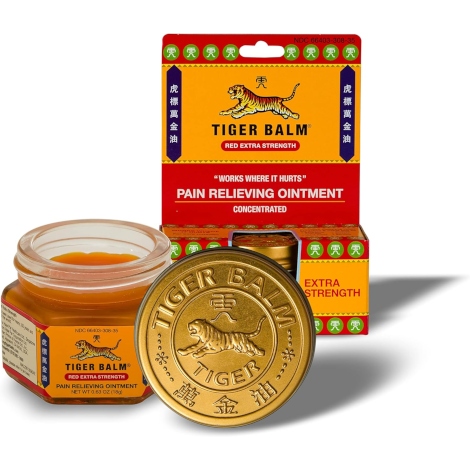
Product Highlights
- Extra-strength herbal pain-relieving ointment
- Used for over 100 years and sold worldwide
- Claims to relieve aches and pains from rheumatism, arthritic pain, and muscle strains and sprains
Pros & Cons
Pros
- Available online and in stores
- Customer reviews found ointment effective
- Under $10
- Also available in patch, cream, liquid, and gel
Cons
- Mixed customer reviews on the smell
- Reddish-orange color can stain clothing and/or skin
- Some customers experienced redness and other allergic reactions
- Extra-strength variety only available as an ointment
Bottom Line
Tiger Balm Extra-Strength Ointment is designed to provide temporary relief for aches and pains. However, multiple customers noted this formula, which has a red color, stained their skin or clothes; they regretted not buying a version of tiger balm that was not red and wouldn’t stain—such as Tiger Balm Ultra.
Tiger Balm has a long history in topical pain relief, with its current formulation having been around for 100 years or more; the name stems from one of the original founders, Aw Boon Haw, whose name translates to “Gentle Tiger,” according to the Tiger Balm website.
RELATED: Best Muscle Recovery Supplements
The site also states that the tiger embodies strength and the balm’s ability to “pounce on pain,” which GGR Senior Editor Erin Chancer, CNC, CPT, found to be pretty accurate. “I had pulled a muscle in the middle of my back before trying this out,” Erin explains, adding, “I feel that it really helped with the pain. I typically use Icy Hot, but found that I liked this better.”
However, her husband tried it for his sore muscles and didn’t notice too much of a difference, leading Erin to rate the effectiveness a respectable 4 out of 5.
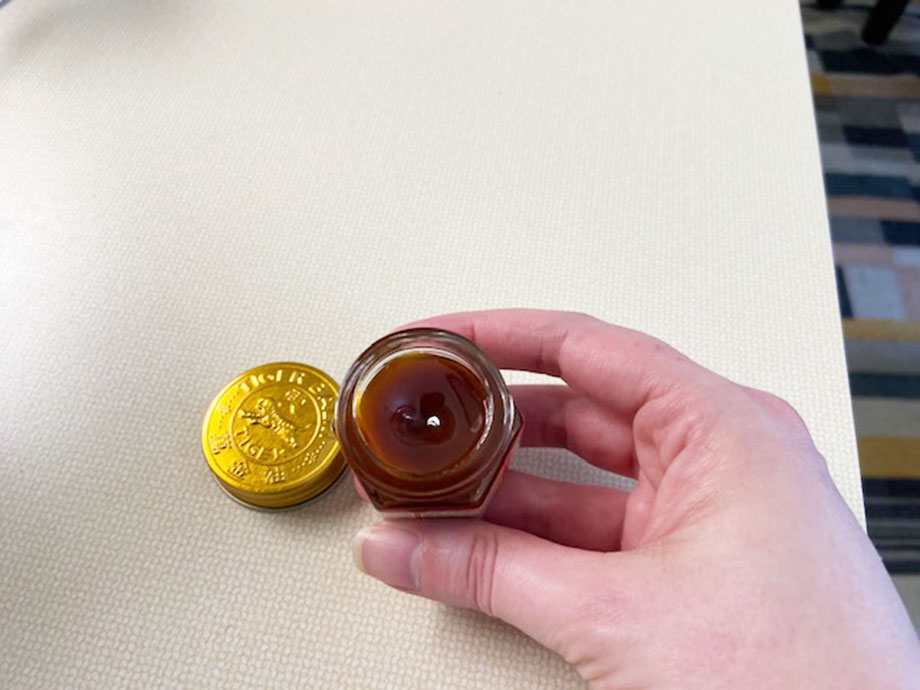
The active ingredients in Extra Strength Tiger Balm are camphor and menthol, which account for 11 percent and 10 percent of the balm, respectively. Camphor and menthol are both counterirritants, used to create a cooling then heating sensation, which distracts nerves in the affected area from the muscle pain. This combination has been used historically in Eastern Asia1 for years.
Along with the camphor and menthol, the muscle rub also has several essential oils, including clove oil. Also known as eugenol2, this oil has been known to have a mild numbing effect (typically used to treat toothaches). Erin gives the formulation a solid 4.5 out of 5.
As effective as Tiger Balm can be, it does have its drawbacks—notably its scent and coloring. Frankly, Tiger Balm smells—not unpleasantly, but it’s a strong smell. It’s sort of a cinnamon and ginger scent according to Erin. “I liked the smell, but it’s not for everyone,” she adds, rating the scent a 3.75 out of 5.
Also, a word to the wise: the reddish-orange color of the balm can stain your fingers and clothes, so be careful in its application. That said, this is an effective balm for those minor aches and pains in life.
| Price | $5.76 ($9.14 per oz) |
| Type | Balm |
| Quantity | 0.63 oz |
| Active ingredient(s) | Camphor 11%, menthol 10% |
Best Budget Muscle Pain Relief Cream: BioFreeze
Good for: Those needing an affordable pain relief solution
Best Budget
Biofreeze Roll On Pain Relief Gel
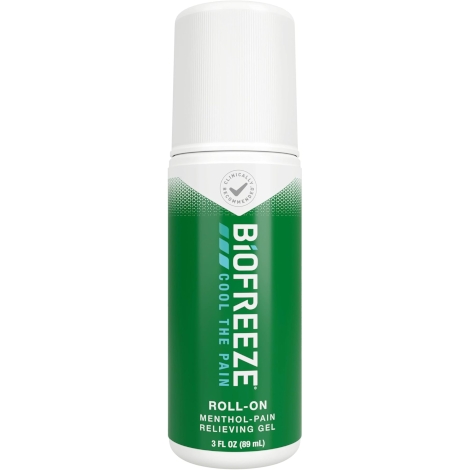
Product Highlights
- Menthol-based topical pain relief gel
- Claims to be top clinician-recommended topical menthol pain relief brand
- Claims to provide fast-acting, long-lasting pain relief
- Biofreeze creates a cold sensation that blocks the pain signals to the brain
Pros & Cons
Pros
- Hands-free applicator
- Customer reviews say smell isn’t too strong
- Widely available in stores
- Also available in patches, cream, spray, liquid, foam, and gel
Cons
- Some customers felt the roll-on wasn’t as strong as the gel form
- More expensive than competitors
Bottom Line
Biofreeze Roll-On Pain Relieving Gel is a topical menthol-based product. Customer reviews generally felt that the roll-on form was less strong than the typical gel or cream in a tube applied by hand. Customers did appreciate that the smell was not overwhelming.
For anyone needing some pain relief—but can’t spend excessive amounts of money on it—we suggest the popular menthol-based roll-on BioFreeze. At around $12 per 3-ounce bottle of BioFreeze on Amazon, you’ll get some great bang for your buck. And anyone who uses topical analgesics regularly knows that 3 ounces can last for a long time.
BioFreeze’s active ingredient is menthol, which is 4% of the formulation. Naturally derived from peppermint plants, menthol is used to distract your pain receptors, which makes for the reduced perception of pain. Still, we typically like to see a bit more menthol in a topical analgesic, so BioFreeze gets only a 2 out of 5 for its formulation.
RELATED: Best Muscle Recovery Tools
That said, BioFreeze still proves effective, as GGR Head of Content Nicole Davis, CPT, PN1-NC, rates its effectiveness a 4 out of 5. “While I don’t feel any pain relief cream will take all your pain away, I do feel that BioFreeze provides some relief,” Nicole explains.
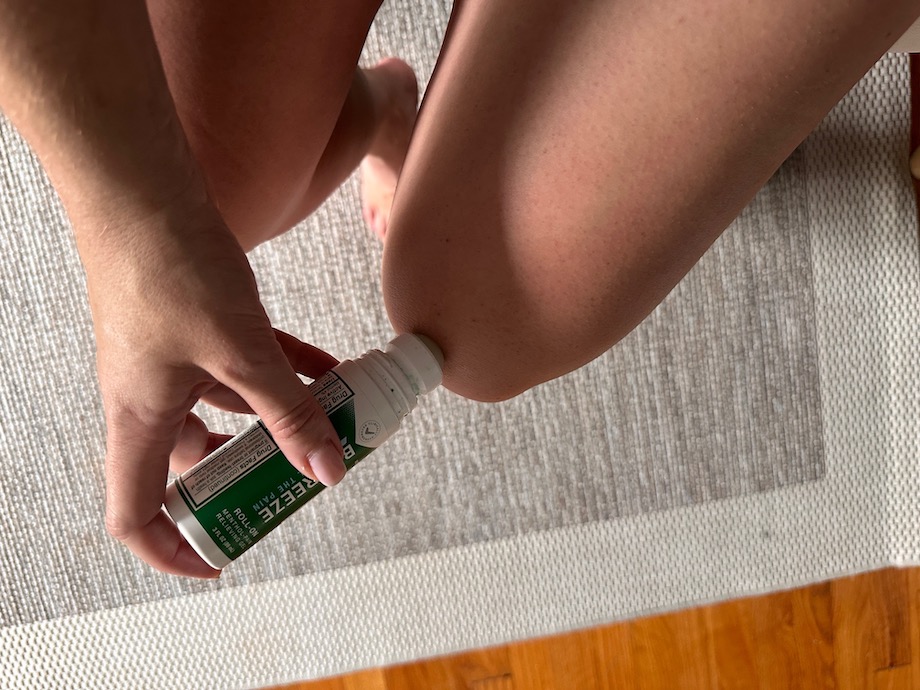
One aspect she liked was that the roll-on never felt hot. “I’ve tried both Bengay and Tiger Balm before, and both give me more of a burning sensation,” Nicole says. This might be because of the lesser amount of menthol. For people who prefer a cooling sensation, this may be the topical cream to use. One 2012 study3 actually found menthol to provide more perceived relief than simple ice packs.
Like many of these muscle pain relief creams we’ll talk about, BioFreeze has a distinct scent. Nicole rates it a 3.75 out of 5, adding, “You’ll know someone is using it before you see the bottle,” she remarks. However, Nicole notes that the smell is nicer than other topical ointments that she’s tried. And with its no-mess roll-on application, we think BioFreeze is a solid option for pain relief.
| Price | $11.98 ($3.99 per oz) |
| Type | Roll-on |
| Quantity | 3 oz |
| Active ingredient(s) | Menthol 4% |
Best Muscle Pain Relief Patch: Icy Hot Original Pain Relief Patch
Good for: People wanting a no-mess application for their pain relief
Best Pain Relief Patch
Icy Hot Original Medicated Pain Relief Patch
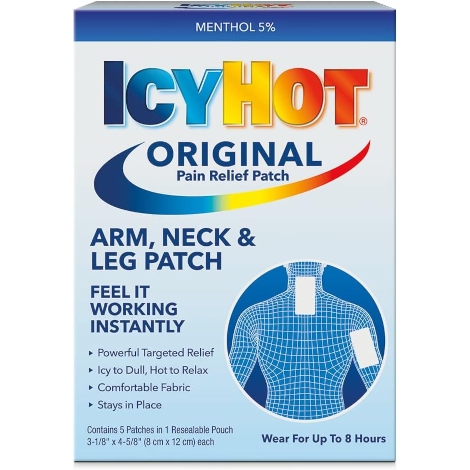
Product Highlights
- Pain relief patch with menthol from a top topical pain relief brand
- Icy to dull pain, followed by hot to relax
- Made by a certified B corp
- Benefits include fast-acting pain relief that works “instantly”
Pros & Cons
Pros
- No-mess application
- Available in wide variety of stores
- Also available in sprays, gels, roll-ons and creams
- Under $10
Cons
- Mixed reviews on the smell
- Many customers on Amazon received damaged product
Bottom Line
Icy Hot is likely a familiar brand for pain relief if you’ve seen one of their many commercials. The customer reviews for this product were generally positive and found the cream effective. Some customers found the smell of Icy Hot to be much stronger than competitors. Many customers that ordered online received crushed or damaged products, so you may prefer buying these in store.
When it comes to topical pain relief, creams, balms, and gels can all be pretty messy, leaving a good amount of residue on your hands. Roll-ons can help alleviate that, but the gel left on your applied area can smear and stain your clothing, too. For the ultimate no-mess application of topical pain relief, I recommend a patch—specifically, the Icy Hot Original Pain Relief Patch.
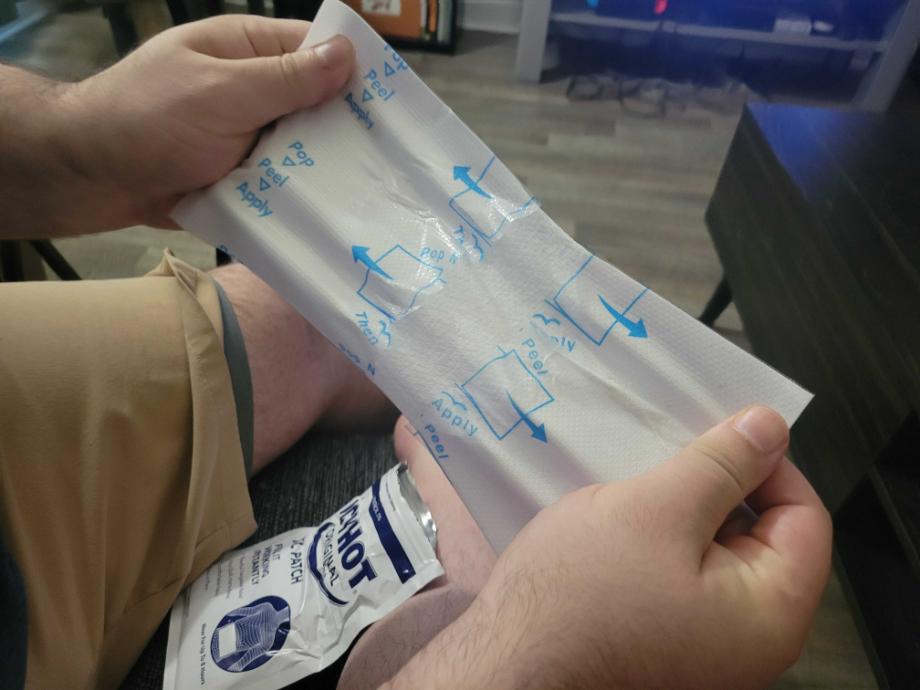
I’ve been competing in Olympic weightlifting for 25 years now, and I find myself falling back on Icy Hot patches whenever I have a tweaked muscle or pain in my back that sets me back on my training of snatches and clean and jerks. My favorite aspect of the patches is that they’re fast-acting and also long-lasting; the patch claims to last up to 8 hours, which I’ve found incredibly accurate in my use. I rate their effectiveness a 5 out of 5.
RELATED: How To Increase Strength
Typically, I’ll use the patch for lower back pain relief, and the menthol-based formulation helps cool and relax muscles in the affected area, allowing me to move a little easier after a bit of an injury. The patch allows me to apply the ointment to the area easily without much clean-up; at the end of the day, I simply peel off the patch. The ease of application is superb compared to other application methods, leading me to rate it a 5 out of 5.
The percentage of menthol is only at 5 percent; I’d like to see a bit more, personally, which earns it a 3 out of 5 for its formulation. That said, the scent is pretty nice. The minty menthol scent of Icy Hot is typically strong, but the smell of the patch dissipates fairly quickly, making it a nice alternative for those who don’t like strong scents.
The main drawback on patches is that the price can add up. A box of five patches can cost just $6, but you can go through five patches much faster than 3 ounces of a topical cream or gel. I rate the price a 3 out of 5, but for those wanting an easy application with little mess, this might be worth the cost.
| Price | $5.99 ($1.20 per patch) |
| Type | Patch |
| Quantity | 5 patches |
| Active ingredient(s) | Menthol 5% |
Best Muscle Pain Relief Roll-On: Penetrex Joint and Muscle Therapy Roll-On
Good for: Those who prefer a roll-on application without any strong scents
Best Roll-On
Penetrex Joint & Muscle Therapy Roll On
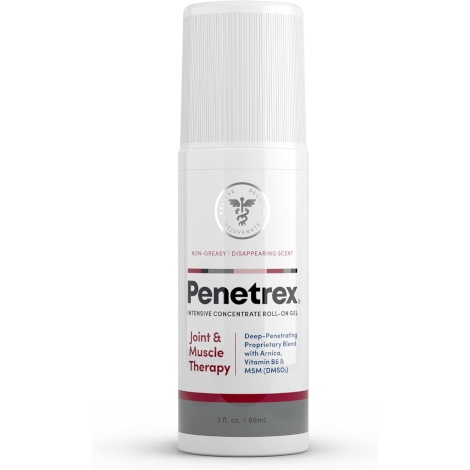
Product Highlights
- Vegan pain relief topical
- No burn, freeze, or strong odor
- Decreases joint and muscle pain
Pros & Cons
Pros
- Cruelty-free and dermatologist-tested
- Non-staining, paraben-free formula
- Made in the United States
- Also available as a cream
- Hands-free roll-on application
- Can be used with heating pads, ice packs, massagers, or supplements
Cons
- More expensive than competitors
- Not widely available in stores
Bottom Line
Penetrex Pain Relief Gel is vegan-friendly and cruelty-free pain relief topical. Customer reviews really liked that it did not have a strong odor closely associated with many pain relief creams. Some customers did prefer competitors because of Penetrex’s higher price point.
Many topical analgesics are effective at treating chronic pain, whether it’s lower back pain, knee pain, or another ailment. However, not every analgesic has as easy of an application as other methods. Our pick for the best roll-on is Penetrex Joint and Muscle Therapy Roll-On. Its ease of application leads GGR Editor Frieda Johnson, NASM-CNC, ISSA-SET, to rate it a 5 out of 5.
Penetrex isn’t your typical ointment; instead of counterirritants, the main ingredients are arnica and methylsulfonylmethane (MSM). According to a 2021 review4, arnica has been used and has been shown to help with both acute and chronic backaches and other pains. MSM has been shown5 to aid in joint pain and inflammation. “It also includes some cooling essential oils like camphor, peppermint, and eucalyptus,” Frieda mentions, rating the formulation a 4 out of 5.
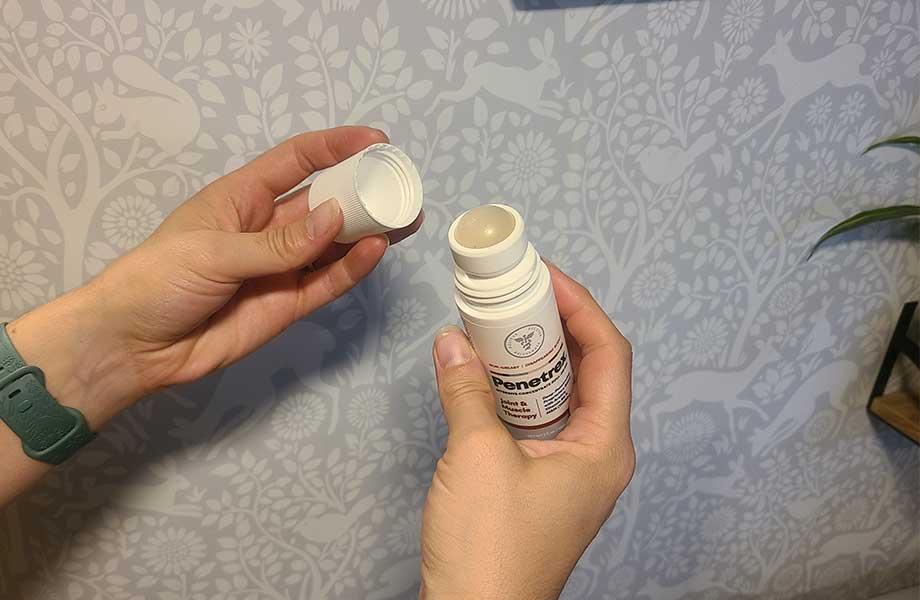
Because it lacks the stronger-scented ingredients of menthol or capsaicin, Penetrex has a more mild scent, leading Frieda to rate the scent a 4 out of 5. “It has a nice smell from some essential oils, but it smells a bit like alcohol, too,” she says.
Frieda rates the effectiveness of Penetrex a 3 out of 5. She explains, “It’s not as strong as other pain relieving creams I’ve used, but it does help relieve the pain for a bit.” Frieda adds, “I reapply it more frequently than other roll-ons, but it doesn’t have the strong tingly feel or smell that many do, so I don’t mind.”
| Price | $17.95 ($5.98 per oz) |
| Type | Roll-on |
| Quantity | 3 oz |
| Active ingredient(s) | Arnica, MSM, camphor |
Best Muscle Pain Relief Cream for Joints: Voltaren Arthritis Pain Gel
Good for: Fitness fanatics looking for joint and muscle pain relief
Best for Joints
Voltaren Arthritis Pain Gel
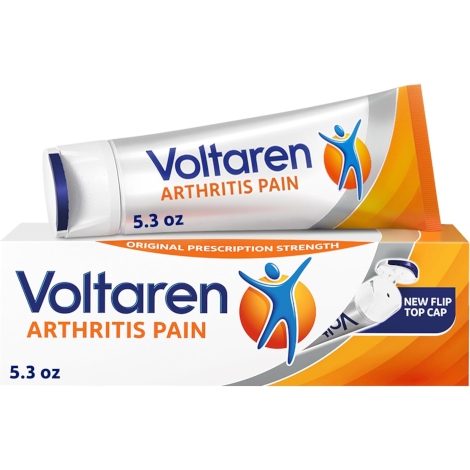
Product Highlights
- Nonsteroidal anti-inflammatory gel used to relieve arthritis pain
- Active ingredient of 1% diclofenac sodium
- Recommended use of smaller joints
- Paraben-free and dye-free
Pros & Cons
Pros
- Paraben-free
- Dye-free
- Alternative to NSAID pills
- FSA or HSA eligible
Cons
- Pricier cost
- Application of cream can be messy
Bottom Line
Voltaren Gel is a pain relief cream using diclofenac sodium, an NSAID drug, to reduce pain in muscles and joints. This topical pain relief cream is a nice alternative to common NSAID pills like ibuprofen and naproxen and can relieve pain in specific areas of the body. However, it poses many of the same side effects of normal NSAIDs; it’s best to consult with a doctor before using.
If you’re suffering from muscle and joint pain, you may need a pain relief product that does more than distract you from the pain. Our pick for the best muscle pain relief cream for joints is Voltaren Gel, with an active ingredient of diclofenac sodium, a non-steroidal anti-inflammatory drug like ibuprofen.
Like other non-steroidal anti-inflammatory drugs (NSAIDs), diclofenac has been shown as an effective method to relieve pain and inflammation in the short term6, earning it a 4 out of 5 for its formulation.
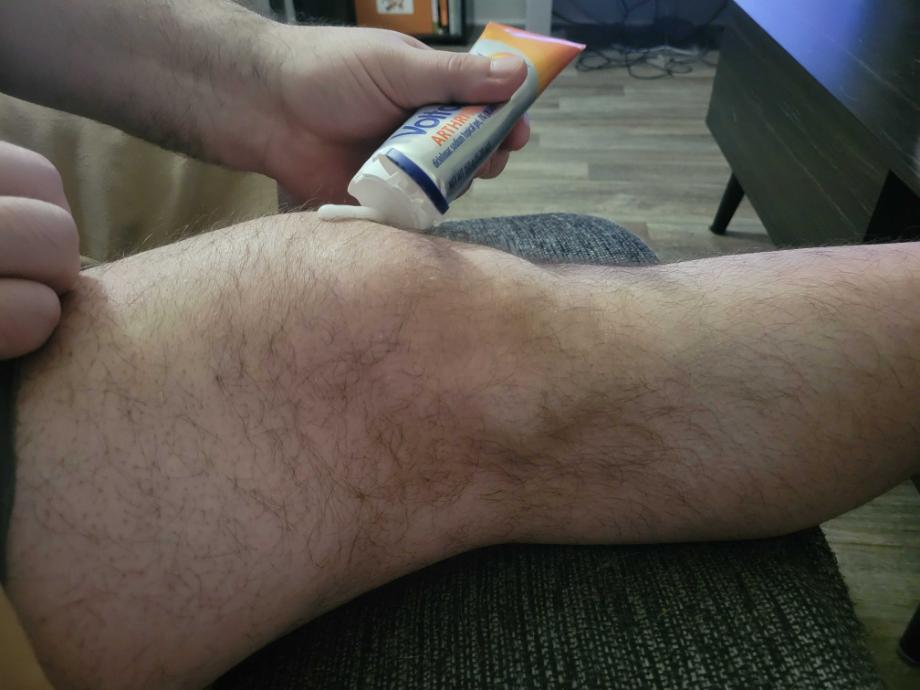
I’ve tested Voltaren and have used it on and off during my weightlifting career after intense back squat sessions. I’ve found it to be pretty effective on small joints: knees, ankles, elbows, and wrists. It hasn’t been quite as good on larger areas, like my lower back. Voltaren says the same on its labeling—that it’s best to use on smaller joints—leading me to rate the formulation and ingredients a 3.5 out of 5.
The scent isn’t wildly strong, but I find it a bit medicinal. Many of the inactive ingredients are alcohols, which gives it that scent, but it’s not a strong scent like many other pain relief gels. I rate the scent a 4 out of 5.
Being a topical cream, you’ll have to rub in the cream with your hand. Fortunately, the non-greasy gel dries quickly, so it doesn’t lead to the mess that other pain relief products can have, earning it a 4 out of 5 for its application.
Many of my weightlifting friends use Voltaren, but complain that the over-the-counter version is only 1% diclofenac, which is the legal limit for OTC gels in the United States. For a maximum strength version for your pain management, you’ll need a prescription.
| Price | $24.69 ($4.65 per oz) |
| Type | Gel |
| Quantity | 5.3 oz |
| Active ingredient(s) | Diclofenac sodium 1% |
Other Muscle Pain Relief Cream We Researched
We looked at quite a few balms, creams, and gels for this list of the best muscle pain relief cream, but not every topical solution could break into our list. Here are some creams we also liked and could recommend, although these honorable mentions didn’t make our final picks:
- Stopain Roll-On: Stopain is an extra-strength roll-on with MSM and glucosamine added into its 8% menthol solution, making it a strong solution for muscle and joint pain alike.
- Icy Hot Max with Lidocaine: This formulation of Icy Hot uses lidocaine as its active ingredient—a numbing agent. While it’s effective at reducing pain, I prefer the menthol formulation for workouts so I can still feel the joints and muscles in use.
- Aspercreme Pain Relief Cream: Over-the-counter Aspercreme uses a salicylate as its active ingredient—trolamine salicylate, which is similar to aspirin.
- Cymbiotika Ultimate Pain Balm: GGR Senior Staff Writer Lauren Strong, CPT, was a big fan of Cymbiotika’s natural pain balm (aside from the $56 price tag—yikes). However, this product has now been discontinued.
How We Picked and Tested Muscle Pain Relief Cream
Many people might be familiar with a few of the pain relief products on our list, but we still went through the rigorous testing process we uphold with all fitness equipment, supplements, and home saunas we review. Here’s a look at some of the factors we looked at while trying out the best muscle pain relief creams:
- Price: To try to make price comparisons more uniform, we looked at the price per ounce of each product—with the exception of pain relief patches. Creams can cost less than $2 per ounce or as high as $20 or more. The median price for most is between $4 and $6, which is where most pain relief creams we tested fell at.
- Active ingredients: The formulation can vary depending on the type of cream, so we looked for common ingredients for pain relief products: menthol, camphor, salicylates, or NSAIDs. We gave bonus points for formulations that included additional effective ingredients for joints, muscles, and aches—such as MSM, essential oils, or even CBD.
- Ease of application: How easily can you apply the cream to the affected area? Creams can be messy, especially if it’s a greasier balm. However, less messy forms of application—roll-ons and patches—scored higher here.
- Scent: Pain relief creams can stink, leading many people to skip them entirely. We rated how strong the scent was for each product, as well as how pleasant (or unpleasant) the smell was.
- Effectiveness: Being fitness enthusiasts, our team tried these products out on common muscle aches, strains, and sprains that happen from daily activity and arm and leg workouts. While no pain relief cream will remove pain entirely, we rated how well they were at helping to reduce pain.
We also took a look at customer reviews and return policies to gauge the customer experience. After rating each of these categories a score of 1 through 5, we ranked each pain relief cream, gell, or roll-on to determine our top picks.
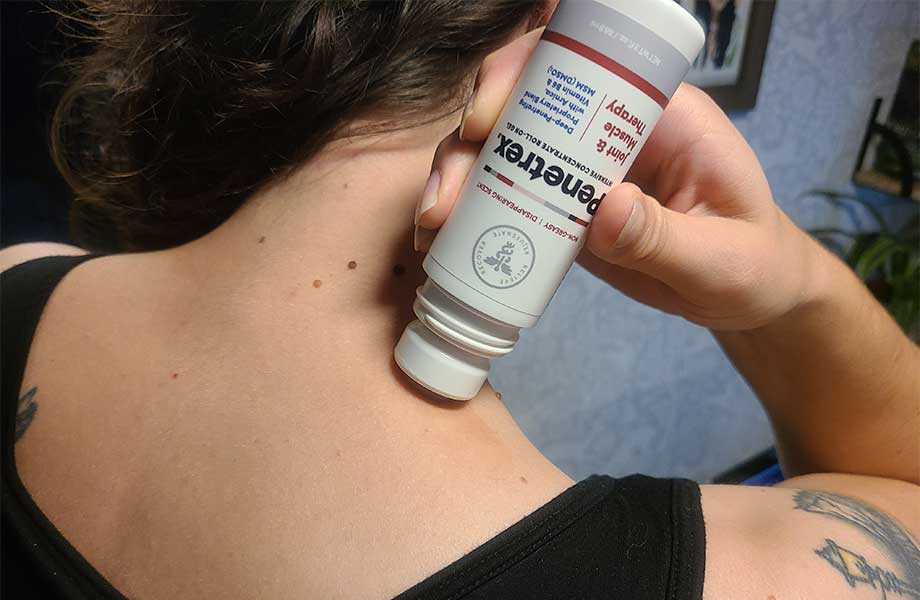
Benefits of Muscle Pain Relief Cream
Muscle pain relief cream is used to distract the user from pain, or to reduce inflammation around the applied area. The main benefit of these products is the reduction of pain, but the way topical analgesics are applied can have other benefits.
Alternative to Pills
If people have aches and pains, anti-inflammatory drugs or pain relief pills are the usual go-to, but for people who prefer to limit their consumption of medicinal pills and capsules, pain relief creams can help. The topical application can also bypass some side effects from oral pain relievers7—like stomach issues.
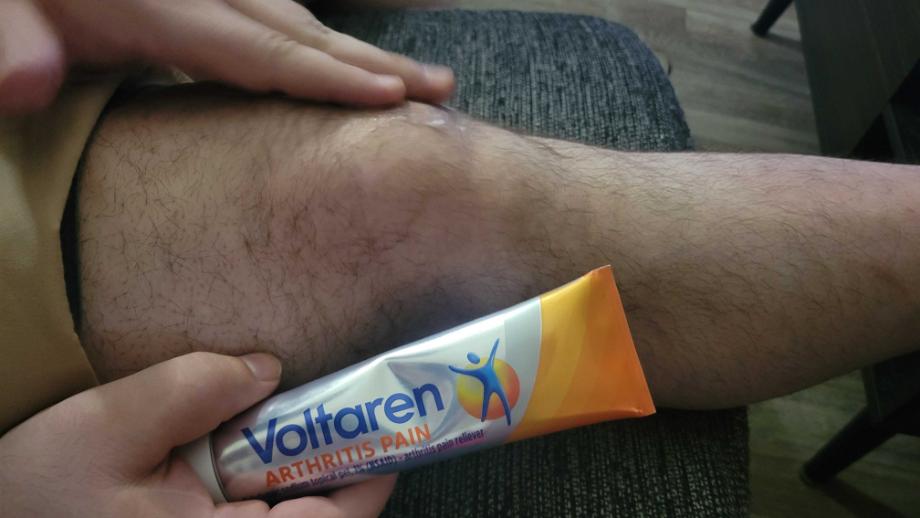
Direct Application
Applying the pain relief lotion or cream directly on the ache or pain can ensure that the product helps the affected area only. Topical application keeps the cream active only in the area you wish for it to be in. You don’t have the ability to isolate an oral analgesic’s effectiveness; with topical ointments, you can focus the relief on a specific area.
Experts Who Contributed To This Article
What to Look for in Muscle Pain Relief Cream
There’s a lot of options when it comes to topical analgesics and pain relief creams. Here are a few of the main factors to consider when purchasing your next gel or roll-on.
Form
There are many different ways to apply a topical ointment onto a strained muscle or achy joint. The most obvious form of pain relief cream is, well, cream. However, using a cream or balm can leave residue on your hands and clothing, so it can get messy. If you’re concerned about making a mess, you can choose a roll-on application, or a pain relief patch instead. These options keep your hands off the cream, making the application free of any messes.
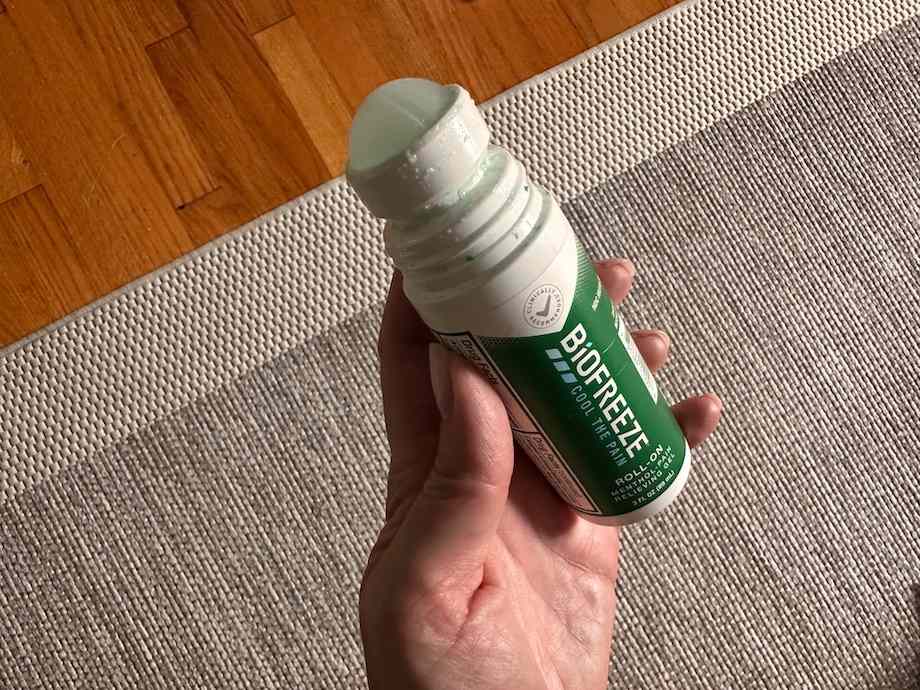
Ingredients
The active ingredients used in pain relief creams vary, but most help relieve pain in similar ways: either by reducing inflammation or distracting the user from the pain. Here are some common active ingredients in muscle pain relief creams and how they work, all to help you decide which method is best for you:
- Menthol and camphor: These counterirritants are some of the more popular ingredients used. Menthol and camphor distract you from pain with the extreme cooling and heating sensation you feel from its application.
- Capsaicin: This ingredient is actually what gives spicy peppers their heat. Capsaicin in a pain relief cream also acts as a counterirritant, using the heating and burning sensation to distract neurons from noticing the pain as easily.
- Lidocaine: Lidocaine is a numbing agent, which can dull minor pain or aches in muscles or joints.
- Salicylates: Salicylates are closely related to aspirin and are used to relieve pain and reduce inflammation8. The most common ones used for pain relief creams are trolamine salicylate and methyl salicylate.
- NSAIDs: Non-steroidal anti-inflammatory drugs are drugs used to reduce inflammation. Ibuprofen and naproxen are some of the more common over-the-counter NSAIDs, but diclofenac sodium is used as a topical NSAID.
Creams may have other ingredients that can aid in pain relief, although they may not be the major player. MSM, glucosamine, arnica, and clove oil are all nice additions to any formula.
Smell
Most pain relief creams are going to smell. Some people—myself included—enjoy the strong smells, but that’s not always the case. If you’re apt to shun strong and spicy smells, you may want to avoid the stronger cinnamon and peppermint scents of some topical ointments, and choose one with a milder fragrance.
RELATED: Best Deodorants for Men
Best Muscle Pain Relief Cream: FAQs
What are topical analgesics used for?
Topical analgesics are a form of medicine used to treat joint or muscle pain. Depending on the active ingredient, the analgesic can help relieve pain by reducing inflammation, or they can provide a heating or cooling sensation, which changes your perception of pain. Additionally, some ingredients act as numbing agents, which can dull pain away.
What cream is best for muscle pain?
There are quite a few ways to target and relieve muscle pain, including numbing agents, anti-inflammatory drugs or NSAIDs, and distracting cooling or heating ingredients—camphor, menthol, or capsaicin.
Our pick for best muscle pain relief cream is Tiger Balm, an ointment containing both menthol and camphor, along with eugenol2 (clove oil), which has a mild numbing effect. The modern form of this cream has been around for over 100 years, and is still one of the most popular pain relief creams on the market.
Is BioFreeze or Tiger Balm better?
Both BioFreeze and Tiger Balm are effective at relieving muscle and joint pain; which one you may prefer will depend on what you’re looking for in your muscle pain relief cream.
BioFreeze’s sole active ingredient is menthol, and at only 4%. TIger Balm contains both menthol and camphor in higher percentages, making it a stronger ointment. With that said, the red-orange tint of Tiger Balm Extra Strength can stain fingers or clothes; plus, some don’t like its strong cinnamon scent, either. While BioFreeze has a distinct smell, too, some may opt for this roll-on for a no-mess application and a (slightly) less harsh scent.
References
- Hoang, D., Wong, A., & Olympia, R. P. (2023). Looking Back to Move Forward: The Current State of Research on the Clinical Applications of Camphor- and Menthol-Containing Agents. Cureus, 15(7), e41426. https://doi.org/10.7759/cureus.41426
- Eugenol (Clove Oil). (2019). In LiverTox: Clinical and Research Information on Drug-Induced Liver Injury. National Institute of Diabetes and Digestive and Kidney Diseases.
- Johar, P., Grover, V., Topp, R., & Behm, D. G. (2012). A comparison of topical menthol to ice on pain, evoked tetanic and voluntary force during delayed onset muscle soreness. International journal of sports physical therapy, 7(3), 314–322.
- Smith, A. G., Miles, V. N., Holmes, D. T., Chen, X., & Lei, W. (2021). Clinical Trials, Potential Mechanisms, and Adverse Effects of Arnica as an Adjunct Medication for Pain Management. Medicines (Basel, Switzerland), 8(10), 58. https://doi.org/10.3390/medicines8100058
- Butawan, M., Benjamin, R. L., & Bloomer, R. J. (2017). Methylsulfonylmethane: Applications and Safety of a Novel Dietary Supplement. Nutrients, 9(3), 290. https://doi.org/10.3390/nu9030290
- Zacher, J., Altman, R., Bellamy, N., Brühlmann, P., Da Silva, J., Huskisson, E., & Taylor, R. S. (2008). Topical diclofenac and its role in pain and inflammation: an evidence-based review. Current medical research and opinion, 24(4), 925–950. https://doi.org/10.1185/030079908×273066
- National Academies of Sciences, Engineering, and Medicine; Health and Medicine Division; Board on Health Sciences Policy; Committee on the Assessment of the Available Scientific Data Regarding the Safety and Effectiveness of Ingredients Used in Compounded Topical Pain Creams; Jackson LM, Schwinn DA, editors. Compounded Topical Pain Creams: Review of Select Ingredients for Safety, Effectiveness, and Use. Washington (DC): National Academies Press (US); 2020 May 13. Summary. Available from: https://www.ncbi.nlm.nih.gov/books/NBK560347/
- Yeoh, S. C., & Goh, C. F. (2022). Topical delivery of salicylates. Drug delivery and translational research, 12(5), 981–1001. https://doi.org/10.1007/s13346-021-00988-5
Further reading

If you’re looking for a treadmill but you’re on a budget, we’ve got you covered. Check out our roundup of the best treadmills under $400. Read more

We surveyed over 2,000 people of varying demographics to see how fitness social media content affects our decision-making process. Read on to see its impact. Read more

Anyone who has a garage full of home gym essentials knows that training can help improve your quality of life and longevity. However, fitness fanatics also know that training regularly will lead to some sore muscles and aches. To help alleviate a bad case of DOMS—delayed-onset muscle soreness—we’ll go with a muscle pain relief cream to alleviate some of our distress.Your latest bout of a sore trapezius or hamstring muscle has probably led you here, » Read more about: Best Muscle Pain Relief Cream (2025): 5 Options Tested by Fitness Experts » Read more

Building strong quadriceps are important for all-around fitness. Try some of these quad exercises to build muscle strength and size during your next sesh! Read more

